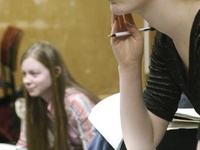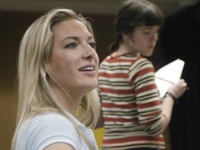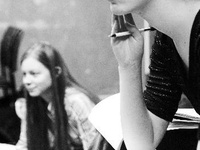TECH BOOM
In order to address the “tech crunch,” or the shortage of technical assistance for various Loeb productions, the HRDC introduced a new tech requirement this fall that obligates members to contribute to the technical aspect of a production during the semester.
The tech requirement was implemented by former technical liaison for the HRDC E. Peyton Sherwood ’04, who said the idea for the requirement came from discussions within the community. Attendees at one of the HRDC’s open meetings raised the idea when the discussion turned to the perennial tech crunch experienced by shows, especially as performance time approaches. Sherwood said he and other HRDC members had previously considered implementing such a requirement, but was not sure it would have enough support from the community at large.
Now in its second semester in effect, the requirement has been received with largely positive response from actors and techies alike. According to Sherwood, 90 percent of the 97 actors in the Loeb participated last semester, whereas in the past, only approximately 18 percent of actors were similarly involved.
“There’s a little less mad stress about making sure that technically [productions] would happen, and that allows for more thoughtfulness than might have been possible in past seasons,” Hodgson says. Technical tasks that fulfill the requirement include carpentry, lighting, loading sets, and sundry other tasks that many productions scramble to complete with the dearth of consistent technical hands and time constraints.
Despite the added responsibility for actors involved with the Loeb, the response from actors has remained largely positive. For Spillane-Hanks, a regular actor and light designer before her directing stint, the requirement has not affected casting for her show, though she says she realizes that some members of the community have reacted to the requirement with greater reservation.
“I met some actors who really are skeptical about it,” she says, “who say ‘I’m here to act. I respect tech people, but that’s not what I’m here to do.’”
But many actors also cite the benefits of contributing to the technical aspect of outside productions as an experience that enriches their own understanding of theater and the theater community at Harvard in general.
“My sense is that many of the actors view the requirement as a way of giving back to the community by working on each others’ shows. The requirement helps to tighten the community while playing a large part in filling the under-stocked tech positions,” says Blase E. Ur ’07, Sherwood’s successor as technical liaison.
Both Ur and Sherwood also point out that requiring HRDC members to work on other productions throughout the semester has opened up more avenues for contact, and in some cases, has helped create ties for future working relationships. Zackheim says he enjoys becoming part of a new cast and crew when he works towards his tech requirement. “It’s more a chance for the people in the limited world of Harvard theater to interact and co-mingle with each other,” he says.
Hodgson says the HRDC plans on further streamlining the tech requirement process, by offering fuller descriptions of available positions and making sure a balanced number of volunteers signs up for each show.
Though the tech problem remains one of the most important issues Hodgson says he and the HRDC board will address in the coming months, he insists that improvements will come largely from building on the successes of the tech requirement.
In addition to addressing technical shortages, Hodgson says he hopes to institutionalize the Visiting Director Project for subsequent semesters. He says student-actors have spoken often of the invaluable experience of working for Lorenzaccio in the fall under the auspices of professional visiting director Jay Scheib.
“The joy of that project is that every new director you get every year will bring a totally different view to acting and theater to the production,” he says. Next year, he says the HRDC anticipates Scott Zigler, an ART professional and Lecturer on Dramatic Arts to participate in the program.
Hodgson says he will also work to include expanding academic courses offerings in the dramatic arts for undergraduates. Though this semester saw a broader range of course offered, including courses on production dramaturgy and vocal production for the stage, Hodgson says there will be a push for more courses next semester. “I’m excited about this season,” Hodgson says. “We try to do our best to bring whatever people get excited about and make it happen.”
—Staff writer Michelle Chun can be reached at chun2@fas.harvard.edu.
—Staff writer Ben B. Chung can be reached at bchung@fas.harvard.edu.














